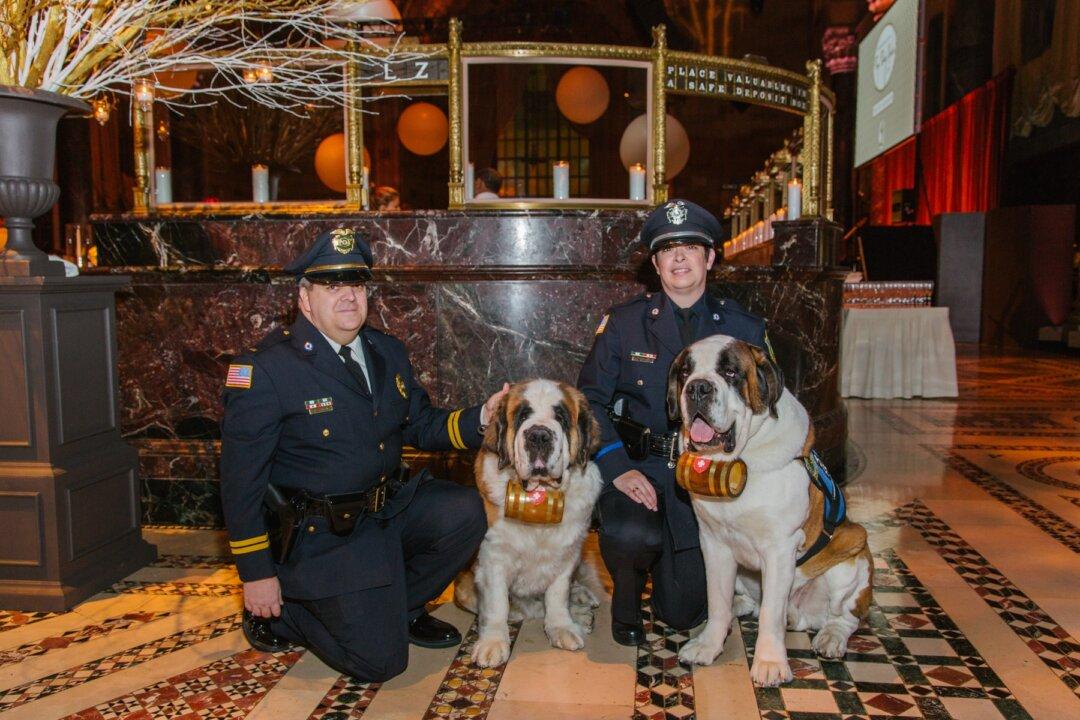BOSTON—Just before the anniversary of the Boston Marathon bombings, the city is still reeling from the loss of two firefighters in a nine-alarm fire on Beacon Street.
Many of those who responded to the fire had also been called to action in the aftermath of the bombings.
For Boston, it seems like one traumatic event after another.
For the first responders, every day, for the 350 days in between the marathons, they arrived at work, not knowing if they would return home.
That kind of ongoing stress takes its toll, according to William Hamilton, chaplain for the Massachusetts State Police and the Bureau of Alcohol, Tobacco, Firearms, and Explosives.
Events of the magnitude of the 2013 attack bring the danger inherent in the job to the forefront, according to Hamilton. “They get it. They know that they are in harm’s way. It is always there, not that they talk about it a lot, but it is always there,” he said.
It is their dedication in the face that daily fear that makes them heroes, says Hamilton. “That’s what it is all about, rising above ourselves to do the good that we can do,” he said.
Comfort and Coping
Lt. William R. Gordon of the Greenfield Police Department and his wife, Officer Laura Gordon, run the first therapy dog team to focus on the needs of first responders and rescue personnel.
Lt. Gordon suffers from post-traumatic stress disorder (PTSD) from, “cumulative events consisting of a series of tragic deaths and failed extended rescues,” in the line of duty, he said.
Gordon sought treatment for his PTSD at the On-Site Academy in Gardner, Mass. They provide treatment for rescue personnel who are temporarily overwhelmed by job stress.
“When I was going through my treatment I started using my dog, Rosie” he said.
Gordon began bringing Rosie to On-Site Academy. “We realized that she was not just helping me, she was helping the other police officers,” he said.
What began as a personal means of coping quickly grew into a different type of first responding: The Gordons and their dog team now bring relief and comfort to the front lines.
“It has become my mission in life. My mission in life is to help the people who help others,” he said.
‘A Positive Distraction’
In 2012 Hamilton went down to Newtown, Conn., as a part of a team responding to the shootings at the Sandy Hook Elementary School. Familiar with Gordon’s work, Hamilton invited Gordon to join him in Newtown.
“Everyone wanted to pet the dog, everyone wanted to take their picture with the dog, and for a moment you could feel the tension let up.” Hamilton said.
Rosie found her way through the crowded emergency operations center in Newtown to an ATF agent who was trying to type his report.
“To do this he has to relive the past few days,” Laura Gordon said. “She went over to him, and with one hand he is typing, with the other hand he is petting the dog. It was what he needed to get his work done.”
Gordon explained PTSD with an image right out of Animal Planet: “Have you ever seen an antelope being attacked by a lion? The first thing he does is run, that is flight. Then if they get caught they start kicking, that is called fight.
When “fight and flight” doesn’t work you go into what is called “dissociation,” according to Gordon.
“We try to break that cycle of disassociation, with distraction. We don’t bring small dogs, we bring Saint Bernards,” he said.
Alan Beck, director of the Center for the Human-Animal Bond at Purdue University, was one of the first to study the connection between humans and animals.
“One way that we deal with the world is to have a positive distraction. Something that holds our attention without being too stimulating,” he said in an interview with WBAA, Public Radio from Purdue.
This positive distraction is what Gordon sees when he brings his dogs into a crisis situation.
“They go from watching the house burn down to petting the dog. Breaking the cycle is important in preventing the PTSD,” he said.
The Greenfield Police Department is the first in the country to have therapy dogs as a part of the force, just like the drug- and bomb-sniffing dogs. Rosie and Clarence were given their badges in June 2013.
Hamilton has been counseling first responders for 32 years. His experience with the Gordons in Newtown prompted him to get his own therapy dog: Ted Ted.
140-Pound Lap Dog
“He is 140 pounds of lap dog,” Hamilton said. “He is a Saint Bernard who thinks he’s a Shih Tzu.” In less than a year of working with Ted Ted, Hamilton has felt the positive effect on his own life. “I lost 50 pounds.”
Laura Gordon credits Rosie for bringing her husband back to the family. “When he was going through his worst times, the dissociation, she could bring him back from that,” she said.
In Hamilton’s experience it really works: “People are hurting and they are still doing their jobs.
“This is not heaven. It’s not hell either, though people like to think it is. But we get those moments of light and joy that allow us to carry on,” Hamilton said.
Sometimes, that joy comes in a big furry package with a wet nose.




